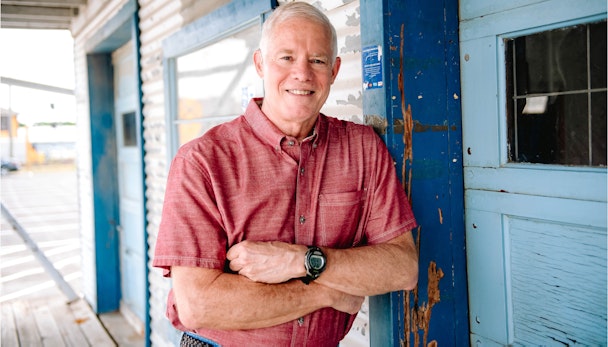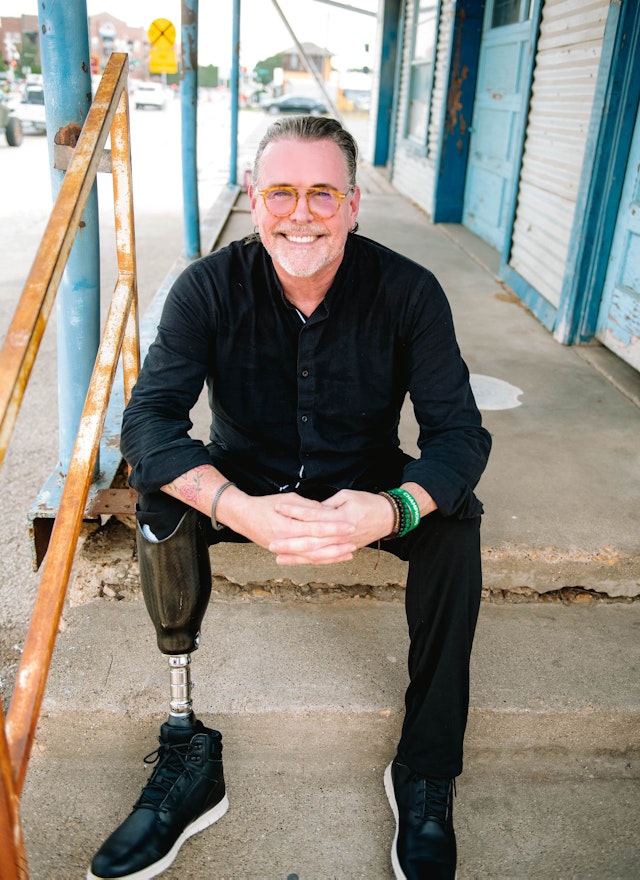Dallas indie agency aims to make disabled talent visible in advertising
The ad industry still treats consumers and workers who have a disability as an afterthought. A new indie agency hopes to push back against that.

Bob Wagner, co-founder of Doable
Given a month to recuperate after his leg was amputated, Hugh Boyle had a lot of time to consider his next move. “I lay there and I thought, what the hell am I going to do?”
Based in Dallas but originally from Birmingham, UK, Boyle had spent decades at some of the biggest agencies in the business, including Ogilvy and Geometry, and was CEO at TracyLocke. But in the autumn of 2021, following what should have been routine surgery led to a severe infection, risk of deadly sepsis meant he had to have a transtibial (the leg below the knee) amputation.
He tells The Drum that, as he lay recovering, he realized his career had been spent in a business largely absent of people with disabilities. In the UK, the most recent industry census data showed 11% of people working in advertising had a disability, versus 14% of the overall working population. “I thought to myself, how many disabled people have I worked with across 30-something years on both sides of the Atlantic? One guy. One person out of thousands.
“It is an industry of beautiful people. Particularly among middle-aged men, ill health is deemed to be a weakness; every middle-aged businessman I know lies about being sick. Where are the hearing-impaired people? The visually impaired people?

“I thought: maybe the talent simply isn’t there,” he recalls. “That was the most preposterous thought in this whole scenario. But it was actually a turning point in my life.
“One in four Americans live with a disability of some sort as defined by the Americans with Disabilities Act (ADA) 2009. One in five working-age adults is the same… something like 15 million work in full-time professional employment and theoretically in advertising, marketing and PR. Disabled people aren’t in the industry – but the talent is there in ridiculous abundance.”
Advertisement
That period of forced reflection, and the anger that Boyle began to feel about the shutting out of disabled talent from the ad industry, led him this year to establish his own agency business, Doable, with co-founder Bob Wagner, an ex-P&G marketer and Omnicom agency veteran.
Wagner has been hearing-impaired since birth and spent much of his career hiding that fact – concealing hearing aids underneath long hair. “I understand disabled consumers not wanting to stand out and the importance and value of meeting their needs on their own terms,” says Wagner.
Doable’s business model aims to open up marketing inside and out to people with disabilities. It is offering a suite of services that could help brands analyze and improve their digital products and experiences so that they’re more accessible.
The idea is to entice brands to go over and above current legal requirements (which, in the US, make companies liable for reaching certain usability standards) around digital accessibility.
“The fear is that accessible design compromises creativity,” says Boyle. “You’ve got to fix it, obviously, or you’re gonna get sued. You’ve got to fix it because there’s a huge audience for you here. But if you let us fix it, we’ll fix it in a way that doesn’t harm your brand integrity whatsoever.
“The best possible people to make your digital property accessible are the people who have to use accessible digital properties.”
Advertisement
In addition, Doable has built up a roster of videographers and photographers, giving it social content and production services. “You don’t have to look further than the disabled community to find some of the most badass content creators,” he says. He hopes that if brands get more disabled people involved at the production and creative stages of their marketing, they’ll be able to move away from the binary archetypes of “superhuman or subhuman”.
Boyle says Doable is up for working with any client that will meet it with respect. “The disabled talent community isn’t asking for favors or benevolence, it’s simply asking for opportunities that they can hit out of the park and, in doing so, deliver enduring value and quality to clients.”
Though the business will be based in Dallas – it is being provided with office space by local indie agency Moroch Partners – it is employing a partially remote workforce so that any staff with a disability don’t face a commute. That will also open it up to clients far beyond Texas, adds Boyle.
Suggested newsletters for you
Helping Boyle and Wagner make the case to brands is a research business, the Consumers with Disabilities Research Foundation, that they’re building up in parallel with the agency. It’s the first firm to offer panel-based research focused on consumers with disabilities in North America and it has been set up in partnership with a British non-profit research organization, the Research Institute for Disabled Consumers (RIDC).
“Every piece of work I’ve ever worked on needed data and insights – all those beautiful heuristic behavioral things you get from focus groups. But [when it comes to consumers with disabilities], there’s none of that. Kantar will occasionally do a study, but there’s no longtail research group focused on consumers with disabilities.”
The founders’ experiences might have led them to start the business, but Boyle says Doable’s reliance on evidence and research, plus their expertise, is what will give it the capability to make a difference.
“Bob has been disabled all his life. I’ve been disabled for five minutes… but being disabled does not give you the right to own this. What does is becoming an expert on the ADA, becoming an expert on accessibility.”
Doable, he says, needs the research business for its own credibility. “We couldn't criticize the industry for not using data and insights when we weren’t using data and insights ourselves.”
But he hopes the firm can be an aid to other agencies and marketers looking to address consumers with disabilities more effectively. “That’s the reason it’s a separate company. We didn’t want a scenario where, if you used the research you would have to use Doable – that would be bullshit.”

